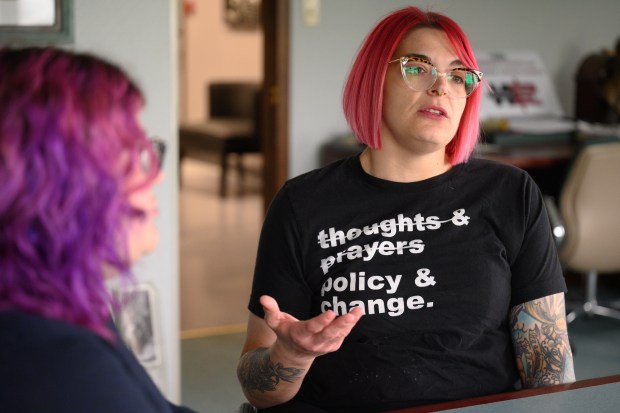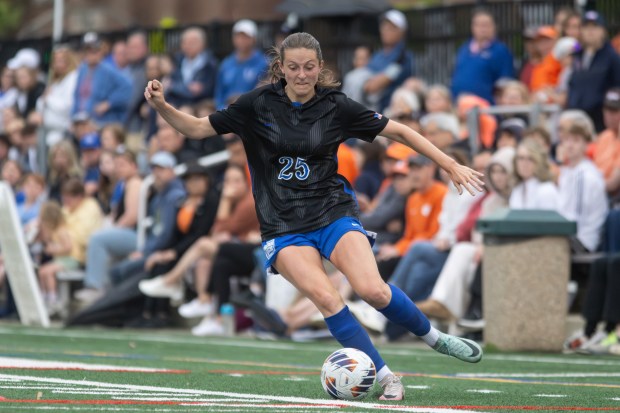Jordan Musenbrock, 35, said Medicaid helped pay for her manual wheelchair and its repairs, shower chair, catheters and multiple medications.
Musenbrock, who has been wheelchair-bound since she was 17 years old following a car accident, said without Medicaid she will have to choose between a drastic decline in health, even death, or financial hardship.
“Either I won’t have what I need to live or I’m going to be in debt to survive,” Musenbrock, of Michigan City, said. “I already have the added difficulty of having a disability, and so now it’s just added difficulty, added stress of will I have what I need to live.”
Over the years, Musenbrock said she has been on Medicaid either as a primary insurance or secondary insurance in various states. Currently, she’s not on Medicaid because of a car accident she was in last year, she said.
After the accident, which was minor, insurance sent her money, which put her over the income limit to be eligible for Medicaid, Musenbrock said. While she’s working toward spending down the money to be eligible for the program again, Musenbrock said the money she received won’t cover her medical payments and has already left her in debt to her wheelchair and medical supply providers.
“Medicaid is not just health care. Medicaid is a lot of people’s lifeline,” Musenbrock said. “People with disabilities want and are a part of the community. We are only asking for our basic needs to be met so that we have the same opportunities as everyone else.”
Carrie Cool, who grew up in Hobart, said she developed psoriatic arthritis when she was 50 years old, which had resulted in many complications, surgeries and medications.
Cool, who is now 64 years old, said Medicaid has helped pay for all her surgeries and the majority of her medications. Without Medicaid, Cool said she wouldn’t be able to afford to pay for her medical expenses on top of her house and bills.
Even on Medicaid and social security disability, Cool said she goes to local food pantries, has started a garden to grow some foods like lettuce and cut meat out of her diet to save money.
“I’m trying right now, but if you took away everything and I had to pay more, there’s no way I could stay (in my house),” Cool said.
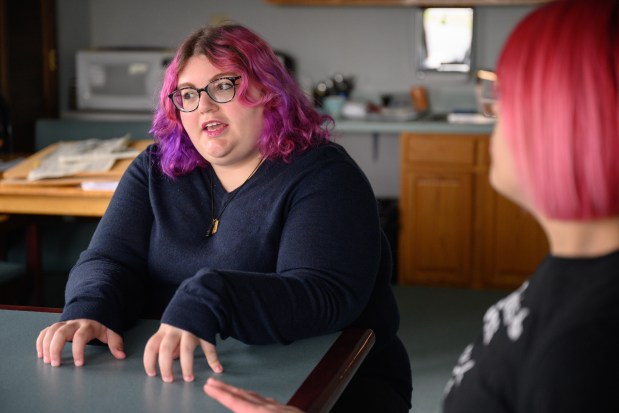
Every time she checks the mail, Cool said she has been stressed about getting a letter with bad news about her Medicaid coverage.
“I just wait, I wait for that letter. If I don’t get a letter, everything is okay so far,” Cool said.
Indiana Medicaid cuts
Senate Bill 2 — authored by Sen. Ryan Mishler, R-Mishawaka — places restrictions on Medicaid, including work requirements on an insurance program for Hoosiers with a medium income and between ages 19 to 64. There are 11 exemptions, including medical clearance as physically unable to work and a parent or caretaker for someone with a serious medical condition.
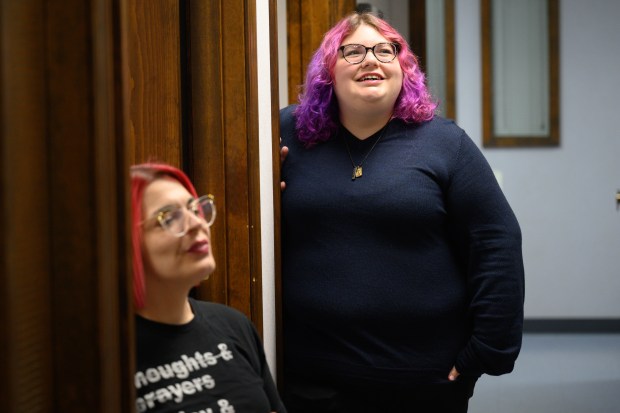
The bill, which was signed into law May 1, initially set a 500,000 cap on the Medicaid program. The legislature removed that portion of the bill before sending it to Gov. Mike Braun’s desk for signature.
Tracey Hutchings-Goetz, an organizer with Hoosier Action, said if the cap had remained in place, about 250,000 Hoosiers would’ve been kicked off the program arbitrarily. Hoosier Action also worked to ensure the three-year enrollment cap was removed from the bill, Hutchings-Goetz said.
“Those two things would’ve been extraordinarily devastating and cruel to everyday people, and frankly destabilize our state’s entire health care system,” Hutchings-Goetz said.
When the state first established the Healthy Indiana Plan as part of the Indiana Medicaid program in 2006, there were 40,000 people on the program, Mishler said. Before COVID-19, there were 390,000 on HIP and currently there are more than 700,000 people on the program, Mishler said.
Overall, Medicaid has grown by $5 billion in the last 4 years, Mishler said, and the rate of growth is greater than the state’s revenue increase. In the two-year budget the legislature passed, Mishler said the majority of new revenue covered Medicaid costs.
The HIP program is 90% federally funded and 10% state funded, Hutchings-Goetz said. Braun has stated he won’t end the match to HIP, Hutchings-Goetz said.
But, under the new Medicaid law, which goes into effect July 1, Hutchings-Goetz said the state’s Family and Social Services Administration secretary has the authority to end the Healthy Indiana Plan.
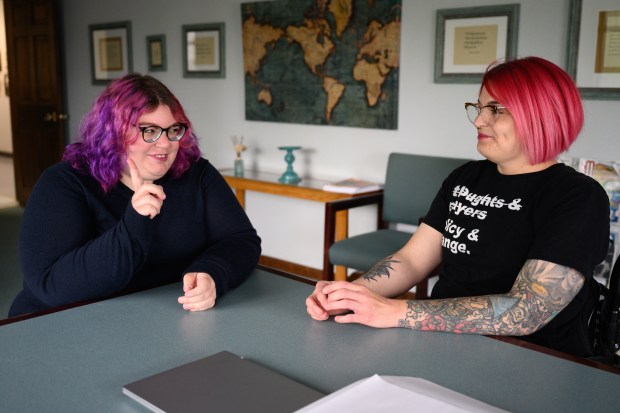
The remaining work requirements in the law will likely see 100,000 to 150,000 people kicked off the program, Hutchings-Goetz said, while requiring FSSA to “conduct more frequent, repetitious, expensive eligibility checks.”
“Those things definitely make the program more inefficient, more expensive and are going to contribute to the suffering of Hoosiers across the state,” Hutchings-Goetz said. “Members of the General Assembly should hear from their constituents every time they have to deal with paperwork issues.”
Any changes to Medicaid “which make it harder to navigate and more expensive to run are not Hoosier common sense; they are just cuts by another name,” Hutchings-Goetz said.
“Cuts to health care are deadly,” Hutchings-Goetz said.
Federal Medicaid cuts
The U.S. House of Representatives passed domestic policy bill backed by President Donald Trump after starting debate before midnight Wednesday and calling for a vote by dawn on Thursday. The vote was 215-214, with all Democrats opposing the bill.
The bill moves forward to the Senate, which hopes to vote on the bill by the Fourth of July holiday.
The more than 1,000-page bill focuses on changes to Medicaid and the food stamps program to make up for some of the lost tax revenue. The bill imposes work requirements on many of those receiving benefits.
Under the bill, the nonpartisan Congressional Budget Office estimates 8.6 million fewer people would have health care coverage and 3 million fewer people a month would have SNAP food stamps benefits with the proposed changes.
The CBO said the tax provisions would increase federal deficits by $3.8 trillion over the decade, while the changes to Medicaid, food stamps and other services would tally $1 trillion in reduced spending. The lowest-income households in the U.S. would see their resources drop, while the highest ones would see a boost, it said.
U.S. Rep. Frank Mrvan, D-Highland, said in a statement he opposed the bill because it prioritizes tax breaks for the wealthy “at the cruel expense of seniors, veterans, children and working families.”
“It is immoral for the powerful and politically-connected to exploit the legislative process for personal gain, and this legislation amounts to the largest transfer of wealth from the pockets of the most vulnerable and working families to the richest amongst us,” Mrvan said.
As the former North Township Trustee, Mrvan said he has “seen the tangible value of the Medicaid program in Indiana” and how it helps seniors, people with disabilities and children.
“Throughout my career, I have worked to support all individuals when they need emergency assistance or hit a bump in the road,” Mrvan said. “It will not only strip away these health benefits, it will also increase private healthcare costs and reduce services for everyone.”
Mrvan said he offered an amendment to the bill to study the effects of this legislation on out-of-pocket costs for healthcare services to prevent, screen for and treat cancer, but the majority did not call the amendment for consideration.
“This deal leaves everyday Americans behind, and our job is to protect and fight for them. I encourage the Senate to reject this deeply flawed legislation,” Mrvan said.
Musenbrock and Brianna Fotinos, both members of the disabilities rights organization Everybody Counts, recently attended ADAPT’s protest in Washington D.C. from May 12 through May 14 to oppose cuts to Medicaid and support fair wages for people with disabilities and their care attendants and affordable, integrated and accessible housing.
The highlight of the protest, Fotinos said, was waiting outside the House Energy and Commerce meeting, where legislators were discussing cuts to Medicaid. The protestors chanted “no cuts to Medicaid” inside the meeting and some got arrested, Fotinos said, which delayed the meeting enough that no vote was held.
The group wasn’t able to talk with U.S. House Speaker Mike Johnson, R-Louisiana, Fotinos said. But, had they been able to talk to Johnson, she said they would have stressed that Medicaid cuts will lead to people dying and focused on the human right to shelter, fair wages and healthcare.
“These are basic human things that we’re asking for, and it’s up to you to also be a human being about this and see what the right choice is,” Fotinos said.
The biggest misconception about Medicaid is that it allows people to “free load” off the government, Fotinos said.
Medicaid offers health insurance to those who need it, Fotinos said. The people on Medicaid either physically can’t work or are working but don’t make enough money for insurance, she said.
With the federal cuts and caps to Medicaid, Fotinos said people who physically can’t work will be forced to meet a work requirement and people will be forced to live in poverty to access basic human needs.
“A system that is already being overtaxed is going to be even more overtaxed. That’s the future that I’m foreseeing with these cuts. A lot of people are going to lose access to very basic needs and a lot of people are going to be left to wither away and die,” Fotinos said.
Hutchings-Goetz said the federal changes to Medicaid will cut funding that trickles down to states and enforce mandatory work reporting requirements. Studies have found that work reporting requirements lead to eligible people being kicked off the program and increases the cost of running the program, she said.
Work requirements don’t help connect people with job opportunities, Hutchings-Goetz said. In the end, work requirements don’t lead to an increase in employment but rather a decrease in people covered by health insurance, she said.
“They are making changes to Medicaid which will only further contribute to the cost of the program in addition to harming people by kicking them off. Fundamentally, you need health care, you need to be healthy, to be able to work,” Hutchings-Goetz said.
The federal Medicaid cuts will just force people, some with serious diagnoses or mental health challenges, to deal with complicated paperwork and bureaucracy “at the hardest time in their life.”
“This is not going to make America healthy again. It’s not going to make anyone’s lives better. It is just going to increase suffering across this country and for Hoosiers in Indiana,” Hutchings-Goetz said.


